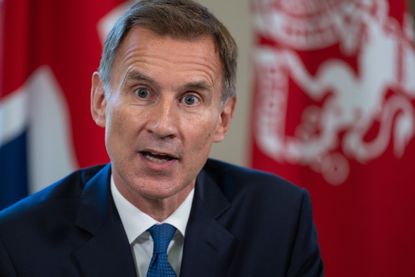Chancellor Jeremy Hunt reverses tax measures and limits energy support in new emergency plan: what it means for your money
The new chancellor has announced a number of U-turns in an emergency statement. What does it mean for you?


Chancellor Jeremy Hunt has cancelled tax reforms and watered down energy support introduced just a few weeks earlier in September’s mini-Budget in a bid to calm markets after immediate financial turmoil wreaked havoc on mortgage rates.
In his bombshell announcement on Monday morning only the stamp duty changes and cut to national insurance are being kept.
“There will be more difficult decisions to be made on tax and spending I'm afraid,” he said. “All departments will need to double their effort and some areas of spending will be cut. Our priority will always be the most vulnerable.”
The new Chancellor partially brought forward the plan by a fortnight to try and calm the financial markets. Further policies are expected to include reforms to childcare and a decision on whether to increase benefits in line with inflation. These will be announced on 31 October.
We explain what we currently know - and how much you’re likely to lose out on.
Energy Price Guarantee promised until April 2023 not October 2024 - though you may get help with rising bills after April
The Energy Price Guarantee - which limits the unit price you pay for gas and electricity and caps the typical household bill at £2,500 - will only last until April 2023 rather than October 2024, with targeted support only for the vulnerable beyond this point.
Hunt said the Treasury will review how to support people with energy bills beyond April 2023 in a way that will cost the taxpayer less, ensure the most vulnerable are still protected and incentivise energy efficiency.
Look After My Bills Newsletter
Get the best money-saving tips, tricks and deals sent straight to your inbox every week. Make sense of your money in partnership with The Money Edit.
It means after April 2023:
- Lower-income households will likely qualify for an as-yet-undecided support package
- Middle-income households may qualify for an as-yet-undecided support package. Current predictions say wholesale energy prices will go up 73% in April, taking a bill for typical use from £2,500 a year to £4,350
- There may be implications for people on fixed tariffs that were higher than the energy price guarantee rate – though we are awaiting further details on this.
2. Your fix was higher than the guarantee rate, but was reduced by up to 4p/kWh gas, 14p/kWh elec which drops you to the price guarantee rate. It's likely this reduction ends in Apr Some firms moved people in this position to standard tariffs, no idea legal position on that yetOctober 17, 2022
There are still a lot of unknowns about the possibility of finding yourself at the mercy of the regulator’s price cap and facing higher bills in April. Right now analyst Cornwall Insight is predicting wholesale energy prices will go up 73% in April - taking a bill for typical use from £2,500 a year to £4,350.
The cap is then predicted to then go down 15% in July to £3,700 a year - higher than the current cap of £2,500. This can all change.
Basic rate income tax to stay at 20% indefinitely - the average worker missing out on £174
The plan to cut the basic rate from 20% to 19% from next April is now shelved indefinitely in a move that will raise £32billion. It means even the previous plan to cut the basic rate to 19% from April 2024 will also no longer go ahead.
“It is a deeply held conservative value that people keep more of what they earn. But it’s not right to fund this tax cut,” said Hunt.
It means anyone earning up to £50,270 will now pay 20% income tax rather than 19% as promised by former chancellor Kwasi Kwarteng.
What you’ll miss out on:
| Annual salary | Current income tax | Income tax after proposed cut | Cost of cancelling cut |
|---|---|---|---|
| £20,000 | £1,486 | £1,412 | £74 |
| £30,000 | £3,486 | £3,312 | £174 |
| £40,000 | £5,486 | £5,212 | £274 |
| £50,000 | £7,486 | £7,860 | £374 |
Stamp Duty cut to go ahead - first-time buyers can save a maximum of £6,250 but high mortgage rates may cancel out any benefit
Stamp duty is axed on properties up to value of £250,000 (increased from £125,000) with first-time buyers exempt on up to £425,000 (increased from £300,000). This is a permanent change, rather than a temporary measure as seen during the Covid pandemic.
What homebuyers will save
| House value | Stamp duty before | Stamp duty now | Saving |
|---|---|---|---|
| £100,000 | £0 | £0 | £0 |
| £200,000 | £1,500 | £0 | £1,500 |
| £300,000 | £5,000 | £2,500 | £2,500 |
| £400,000 | £10,000 | £7,500 | £2,500 |
| £500,000 | £15,000 | £12,500 | £2,500 |
What first-time buyers save
| House value | Stamp duty before | Stamp duty now | Saving |
|---|---|---|---|
| £100,000 | £0 | £0 | £0 |
| £200,000 | £0 | £0 | £0 |
| £300,000 | £0 | £0 | £0 |
| £400,000 | £5,000 | £0 | £5,000 |
| £500,000 | £10,000 | £3,750 | £6,250 |
It means first-time buyers can save a maximum of £6,250 on the purchase of their home.
However, while a cut to stamp duty may appear appealing, it may actually become irrelevant due to increasingly expensive mortgage deals and tightening affordability tests. Lenders are now increasing the cost of deals, with the typical two-year fixed 6.47% according to Moneyfacts, AND cutting the maximum they will lend a prospective homebuyer as they factor in higher energy and food prices and reduced disposable income.
National Insurance cut to go ahead - the average worker will save a paltry £217
The reversal to the National Insurance rise, to be applied to workers’ pay from 6 November, will remain.
What you’ll save:
| Income | Saving after National Insurance cut from 6 Nov |
|---|---|
| £15,000 | £24 |
| £20,000 | £92 |
| £30,000 | £217 |
| £40,000 | £342 |
| £50,000 | £467 |
However, with rising inflation, high food prices, pricey energy bills and increasing travel costs, any saving workers make here is unlikely to go very far.
Dividend tax cut scheduled for April 2023 scrapped - investors will have to pay more on their earnings
In April, dividend tax rates went up by 1.25 percentage points. Basic rate payers now pay 8.75% tax on dividends (up from 7.5%), higher-rate payers will pay 33.75% (up from 32.5%), while top-rate payers will pay 39.35% (up from 38.1%).
These increases were due to be reversed from April 2023, but will now stay where they are.
IR35 off-payroll tax reforms will remain - contractors will become employees and pay higher amounts of tax (or dropped)
The somewhat controversial continuation of IR35 will mean firms have to take responsibility for the tax paid by freelancers or contractors to stop so-called disguised employment, where such workers were in effect full-time employees who chose to pay less tax at a company by working “off payroll”
Katie is staff writer at The Money Edit. She was the former staff writer at The Times and The Sunday Times. Her experience includes writing about personal finance, culture, travel and interviews celebrities. Her investigative work on financial abuse resulted in a number of mortgage prisoners being set free - and a nomination for the Best Personal Finance Story of the Year in the Headlinemoney awards 2021.
-
 Three energy firms pay £8m in switching compensation - has your provider paid out?
Three energy firms pay £8m in switching compensation - has your provider paid out?More than 100,000 customers have received compensation after changing providers, but is now a good time to switch energy suppliers?
By Tom Higgins Published
-
 Save £300 on your supermarket shop with cashback accounts
Save £300 on your supermarket shop with cashback accountsBanks, credit card companies and cashback sites are all offering cashback on your supermarket shop, but can you use them all to max out your savings?
By Vaishali Varu Published
-
 Save on petrol: how to save 5p off a litre of fuel at Morrisons
Save on petrol: how to save 5p off a litre of fuel at MorrisonsPetrol prices may have been falling since last summer but every penny counts at the pump. Here’s how to save 5p a litre at Morrisons for a limited time
By Sue Hayward Published
-
 Morrisons relaunches discount scheme with cheaper prices for loyal shoppers
Morrisons relaunches discount scheme with cheaper prices for loyal shoppersMorrisons is the latest supermarket to revamp prices and offers for its loyalty scheme members
By John Fitzsimons Published
-
 Coronation freebies and discounts: what’s up for grabs
Coronation freebies and discounts: what’s up for grabsFrom free railcards and holiday giveaways to discounts off food, we highlight the special offers launched to mark the coronation of King Charles III
By Ruth Emery Last updated
-
 8 ways to get interest-free money if you’re struggling
8 ways to get interest-free money if you’re strugglingHere are 8 clever ways to get interest-free income if you’re struggling with the rising cost of living
By Vaishali Varu Last updated
-
 Best birthday freebies and discounts
Best birthday freebies and discountsEnjoy your special day with these birthday discounts and freebies - we highlight 22 of the best offers
By Vaishali Varu Published
-
 Festival ticket scam warnings – how to protect yourself
Festival ticket scam warnings – how to protect yourselfConcert ticket scams have rocketed by more than 500% over the past year, while festival fraud has more than doubled. Here’s how to keep yourself safe ahead of the festival season.
By Tom Higgins Published
-
 Co-op Member Prices: Supermarket unveils discount scheme for loyal shoppers
Co-op Member Prices: Supermarket unveils discount scheme for loyal shoppersNew Co-op scheme means reduced prices for shoppers who join the co-operative. How much does it cost to join, and how does it compare to similar schemes run by Sainsbury’s and Tesco?
By John Fitzsimons Published
-
 Emergency alert test: what to expect and how to avoid being scammed
Emergency alert test: what to expect and how to avoid being scammedWe tell you everything you need to know about the UK’s first emergency alert test, which takes place this Sunday
By Vaishali Varu Published